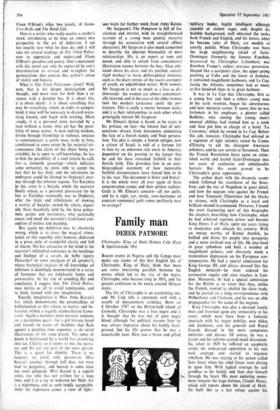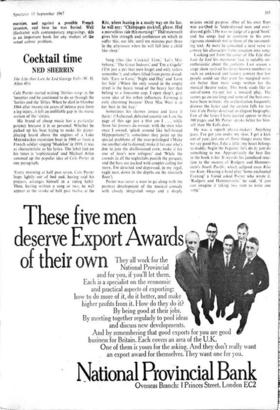Family man
DEREK PATMORE
Recent events in Nigeria and the Congo must make any reader of this first English life of ' Christophe, King of Haiti, think that there are some interesting parallels between the events which led to the rise of the negro, Christophe, who became king in 1811, and the present confusion in the newly created African states.
The life of Christophe is an astonishing one, and Mr Cole tells it extremely well with a wealth of documentary evidence. Born on 6 October 1767 on the British-held island of Grenada, Christophe was a free negro and it is thought that he was not of pure negro, blood although for political reasons later he was always imprecise about his family back- ground, but his life proves that he was a remarkable man. Here was a brave and gifted Anifiliiry • leader, highly intelligent although capable' of violent rages, and, despite his humble background, well educated (he spoke both French and English, and his letters, when he became ruler of Haiti, are models of courtly polish). When Christophe was born the large neighbouring island of Saint- Domingue (formerly the famous Espanola discovered by Christopher Columbus), was Bourbon France's richest overseas possession. Shaped like a scorpion's claw, the upper prong pointing at Cuba and the lower at Jamaica, it contained magnificent harbours, and Le Cap, facing the Atlantic, sometimes had as many as five hundred ships in its great harbour.
It was in Le Cap that Christophe, first as a young boy and then a robust young man in his early twenties, began his adventurous and later meteoric career. It seems that he was fortunate in his employer, a planter called Badeche, who sensing the young man's unusual abilities had trained him as a cook and then put him in charge of a hotel, 'La Couronne,' which he owned in Le Cap. Before this job, however, Christophe had enlisted in a regiment of light infantry raised by Comte d'Estaing to aid the insurgent American colonists, and he saw service at Savannah. Then the French Revolution burst upon an aston- ished world and hurled Saint-Domingue into ten years of confusion and unbelievable horrors. But this event proved to be Christophe's great opportunity.
The author deals with the dramatic events which followed the overthrow of the. Bour- bons and the rise of Napoleon in great detail, and how the negroes rose against the French and how Toussaint l'Ouverture led the blacks to victory, with Christophe as a loyal and brilliant second-in-command. However, I found the most fascinating part of this biography the chapters describing how Christophe, when he had achieved supreme power and become King Henry I of Haiti, spent ten years trying to modernise and educate his country. With an energy worthy of Kemal Atattirk, he bullied and drove his people into prosperity and a more civilised way of life. He also lived in great splendour and built a number of magnificent palaces, and obviously made a tremendous impression on his European con- temporaries. He had a special admiration for King George III, and always dressed like this English monarch—he even ordered his coronation regalia and state coaches in Lon- don. Moreover, he had a special admiration for the British as he knew that they, unlike the French, wanted to abolish the slave trade, and he carried on a long correspondence with Wilberforce and Clarkson, and he was an able propagandist for the cause of the negroes.
King Christophe was also a devoted family man and frowned upon any immorality at his court, which must have been a fantastic spectacle with his negro nobility, now dukes and duchesses, and his generals and Royal Guards dressed in the most sumptuous uniforms and dresses. Of course, he was a tyrant and his reforms caused much discontent. So, when in 1820 he suffered an apoplectic stroke the widespread opposition to his rule took courage and started to organise rebellion. He was staying at his palace called Sans Souci when the rebel forces were closing in upon him. With typical courage he said goodbye to his family and then shot himself 'through the heart. His most enduring monu- 'meat remains the huge fortress, Citadel Henry, which still towers above the island of Haiti. He built this as a last refuge against his
enemies, and against a possible Preach invasion, and here he was buried. Well illustrated with contemporary engravings, this is an important book for any student of the vexed colour problem.































 Previous page
Previous page